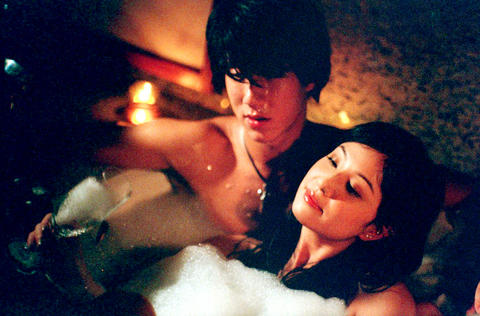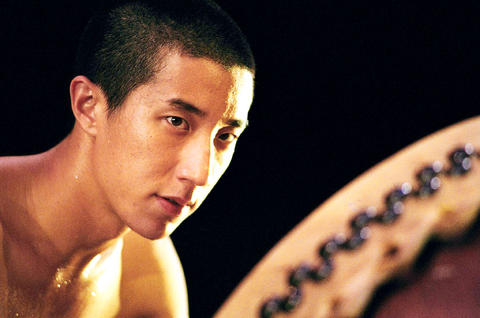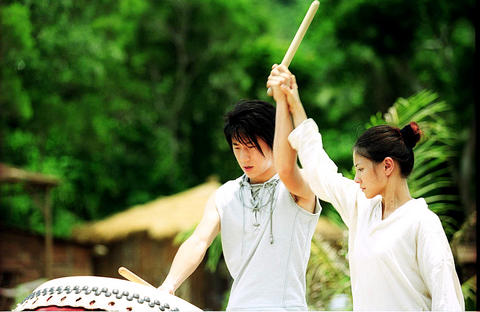Director Kenneth Bi (畢國智) saw Taiwan's U-Theater (優人神鼓) performing Sound of the Ocean (聽海之音) in Hong Kong in 2000, and was stricken with the profound power of the group's drumming. He began envisioning a film about the reclusive performance troupe. Countless visits to the theater and nearly five years of preparation after, shooting began for the project - a collaboration between filmmakers and actors in Hong Kong, Germany and Taiwan. The end result is a mixture of family drama and Zen Buddhism.
The story follows Sid (played by Jaycee Chan, 房祖名), a reckless young rock drummer raised in a Hong Kong family tied to a triad gang. Infuriating a mob boss who vows to revenge the humiliation inflicted upon him, Sid is sent to Taiwan by his father Kwan (played by Tony Leung Ka-fai 梁家輝) to hide out.
Bored with his dull life in the countryside, the young man is drawn by the sound of drumming from the mountain and discovers a group drummers who live in seclusion, practicing Zen Buddhism.

PHOTOS: COURTESY OF ARM FILMS
After joining the group, Sid changes. He comes to realize that drumming is not merely about playing a musical instrument, but a way of meditation, a rigorous training for body and soul.
Meanwhile, Kwan is betrayed by other ring members and murdered in jail. The turn of fate forces Sid to choose between revenge for his father and his newly-found self.
Visually speaking, the film portrays its two main locations differently. The hand-held camera gives Hong Kong a fast-pacing, chaotic look. Tinted with dense, shadowy colors, it paints a world of triad-related violence and betrayal. The mountain range in Taiwan, on the other hand, is represented as a spiritual retreat where birds chirp in the lush woods. As the first third of the film, reminiscent of Hong Kong gangster flicks, gives way to the spiritual practice of U-Theater, the narration takes a documentary-like turn to detail the daily routine of physical training, meditation and drumming. In so doing, the tension between the dramatic flow and the exposition on U-Theater is awkwardly felt at times. Adding to this, director Liu Ruo-yu (劉若瑀), drum master Huang Chih-Chun (黃誌群) and troupe members all star as themselves.

Bi manages to bring together different dramatic themes - self-exploration, religion, family relationships and the art of drumming - into a coherent narration, yet the straightforward storytelling fails to fully engage the audience in the minds of the characters.
The son of Jackie Chan (成龍), 23-year-old Jaycee Chan turns in a passable performance as a youth learning to master his turbulent soul while award-winning actress Angelica Lee is confined in a flat role of the young drummer Sid secretly admires.
To U-Theater, known for their austere way of life as much as their drumming, the project is a daring experiment with the commercial world. "Director Bi followed each and every performance of U-Theater [during the five years of preparation]," Liu said. "He made documentaries about us and interviewed the troupe members … . We agreed to participate as we were moved by his sincerity and passion for the project."

The troupe trusts the director because it feels he understands their philosophy, and has embodied their lifestyle accurately in the film, allowing the members to star as themselves without interference.
"Some of our performers doubted whether the film could depict U-Theater in a proper way. But after attending the first screening, we feel that the film conveyed the power of our art … I think that the film is not about casting the U-Theater as actors, but about how a youth is changed and inspired by U-Theater," Liu said.

April 28 to May 4 During the Japanese colonial era, a city’s “first” high school typically served Japanese students, while Taiwanese attended the “second” high school. Only in Taichung was this reversed. That’s because when Taichung First High School opened its doors on May 1, 1915 to serve Taiwanese students who were previously barred from secondary education, it was the only high school in town. Former principal Hideo Azukisawa threatened to quit when the government in 1922 attempted to transfer the “first” designation to a new local high school for Japanese students, leading to this unusual situation. Prior to the Taichung First

The Ministry of Education last month proposed a nationwide ban on mobile devices in schools, aiming to curb concerns over student phone addiction. Under the revised regulation, which will take effect in August, teachers and schools will be required to collect mobile devices — including phones, laptops and wearables devices — for safekeeping during school hours, unless they are being used for educational purposes. For Chang Fong-ching (張鳳琴), the ban will have a positive impact. “It’s a good move,” says the professor in the department of

On April 17, Chinese Nationalist Party (KMT) Chairman Eric Chu (朱立倫) launched a bold campaign to revive and revitalize the KMT base by calling for an impromptu rally at the Taipei prosecutor’s offices to protest recent arrests of KMT recall campaigners over allegations of forgery and fraud involving signatures of dead voters. The protest had no time to apply for permits and was illegal, but that played into the sense of opposition grievance at alleged weaponization of the judiciary by the Democratic Progressive Party (DPP) to “annihilate” the opposition parties. Blamed for faltering recall campaigns and faced with a KMT chair

Article 2 of the Additional Articles of the Constitution of the Republic of China (中華民國憲法增修條文) stipulates that upon a vote of no confidence in the premier, the president can dissolve the legislature within 10 days. If the legislature is dissolved, a new legislative election must be held within 60 days, and the legislators’ terms will then be reckoned from that election. Two weeks ago Taipei Mayor Chiang Wan-an (蔣萬安) of the Chinese Nationalist Party (KMT) proposed that the legislature hold a vote of no confidence in the premier and dare the president to dissolve the legislature. The legislature is currently controlled